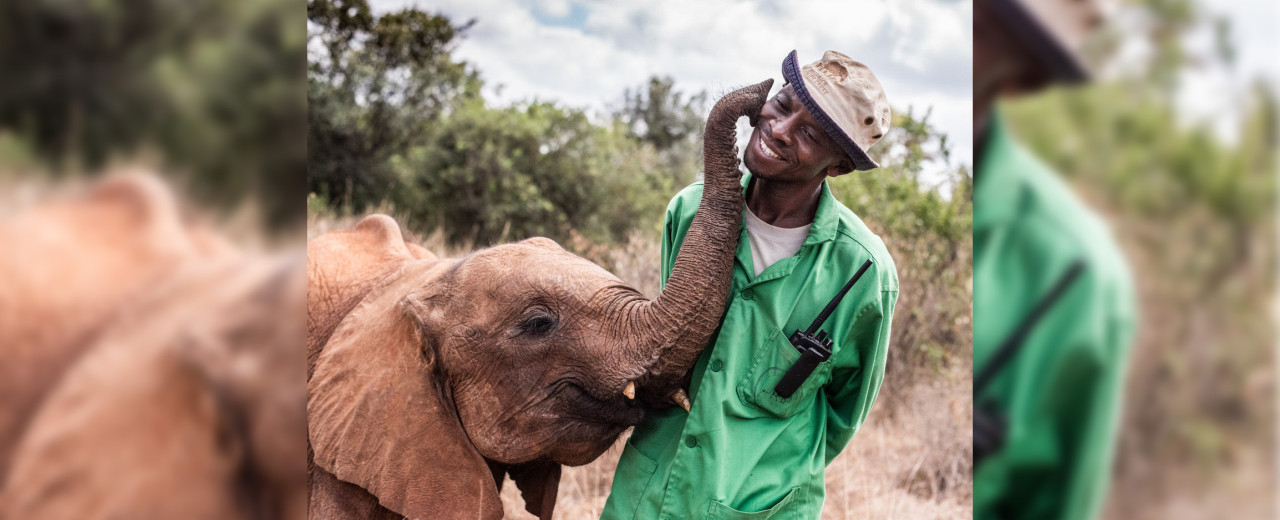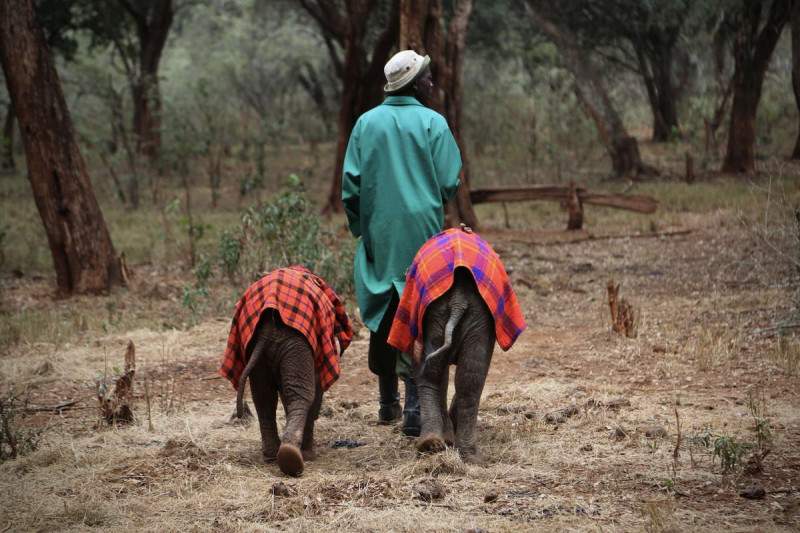Interview with the team: Julius Shivegha, Elephant Keeper, Nairobi Nursery

An interview from a keeper working with our chosen charity is Sheldrick Wildlife Trust.
You’ve been a Keeper for a long time, Julius! How long have you been working for the Trust?
I have been a Keeper for 16 years now.
How did you come to this job?
I used to come to the Nursery, 20-something years ago, as a local tourist for the public visit. The more I visited, the more I got a feeling about the elephants. When I was looking for a job, my friend who was working here recommended me for an interview. Luckily, the elephants accepted me.
Can you explain what you mean by that?
The interview was almost conducted by the elephants. What I have come to learn is that elephants can read your heart. If you have good intentions towards them, if you love them, they know that and they accept you.
Did you grow up among wildlife?
I grew up in Western Kenya, then moved to Nairobi after high school. But the Nursery was my first exposure to elephants. When I first started, it was a bit of a challenge. I was a driver and a chef before I became a Keeper, wearing a white shirt and a tie. Sometimes I wondered if I would make it, but it was the welcome and the love that I received from the elephants that nurtured my love for the job.
Have elephants shaped who you are as a person?
Having this relationship with the orphans has also taught me how to take care of my own family. I also consider the orphans my wild animal family, and my kids are my human family. I have two families!
You’ve been integral to the rescues of many orphans over the past 16 years. Does one individual’s story stand out in your mind?
In this life of elephants, the story of Mbegu will always stand out to me. She had such a horrific rescue. It really broke my heart into pieces, seeing that baby lying on the ground, bleeding from the wounds humans inflicted upon her. And yet the people who inflicted those wounds were contradicting themselves, not wanting to give up Mbegu to be helped. They were very rowdy and wanted to attack us. It really killed my heart. Eventually, the area chief managed to talk to them and convinced them to let us rescue her.
Mbegu was very fearful, very scared, but the minute she arrived at the Nursery, she fell in love with everyone. She grew up with that maternal instinct, wanting to love and take care of the young ones.
What is it like to see your Nursery babies graduate to a Reintegration Unit?
It is bittersweet. We love these babies and would want to stay with them forever, but at the end of the process, they belong in the wild. We have to put them back in nature. To some extent, I think of it like when you have a child or a younger brother or sister. Eventually, they have to grow up and have their own life.

This has been a very challenging year for elephants, hasn’t it?
It has been a very difficult year. We have a lot of babies coming in, due to the drought but also due to human-wildlife conflict. Elephants are hungry, and they end up in humans’ farms. People want to protect their crops, but the animals are looking for food.
It is sad, having received so many orphans, but the good thing is that we have managed to save a bigger number compared to other droughts. We have done well in the form of reviving their lifespark.
We have witnessed some miracles this year, haven’t we?
Yes, there is an orphan who just came in recently. No one expected this elephant to survive, because he was so far gone. He was on a drip for three days, collapsed in a coma. But today here he is, looking good, happy, with a big appetite.
You have lots of little babies in your care right now!
The likes of Mzinga, Nyambeni, Shujaa, and a number of others not yet on the fostering programme — they are tomorrow’s generation of elephants. We wish they hadn’t lost their families, but now they have us. As they go on in their reintegration journey, we know the Nursery will still be here to save more elephants.
Raising orphaned elephants comes with its fair share of heartbreak. How do you manage the ups and the downs?
We want all our elephants to survive, so it breaks my heart to lose one. Every elephant we rescue, we are full of hope that they will make it. When you lose one, despite trying everything to save it, it really breaks your heart.
But then to see an orphan who came in such a bad condition, yet survived — these orphans give us hope. I think of Kamili, who was collapsed, or Sagateisa, who came to us a skeleton. Now, their cheeks have filled out, they’re healthy and happy and even chubby. These elephants give us hope.
You’ve now spent much of your life around elephants. What is something you’ve learned about them that might surprise people?
I always say that elephants are kind of another species of human beings, living in the wild. In fact, they are even more intelligent than human beings.
In a few sentences, how would you describe the work of the Sheldrick Wildlife Trust?
The Trust is doing a very amazing job. Not only are we saving the lives of these poor orphaned elephants, we are also protecting the wilderness and wildlife. We are also helping the community, educating local school kids, supporting them with our school feeding programme, taking them on game drives, and showing them films about conservation — that is for the future generation of protecting our environment.
